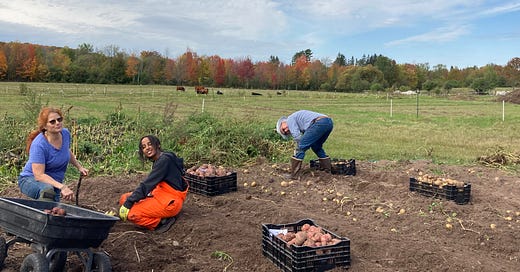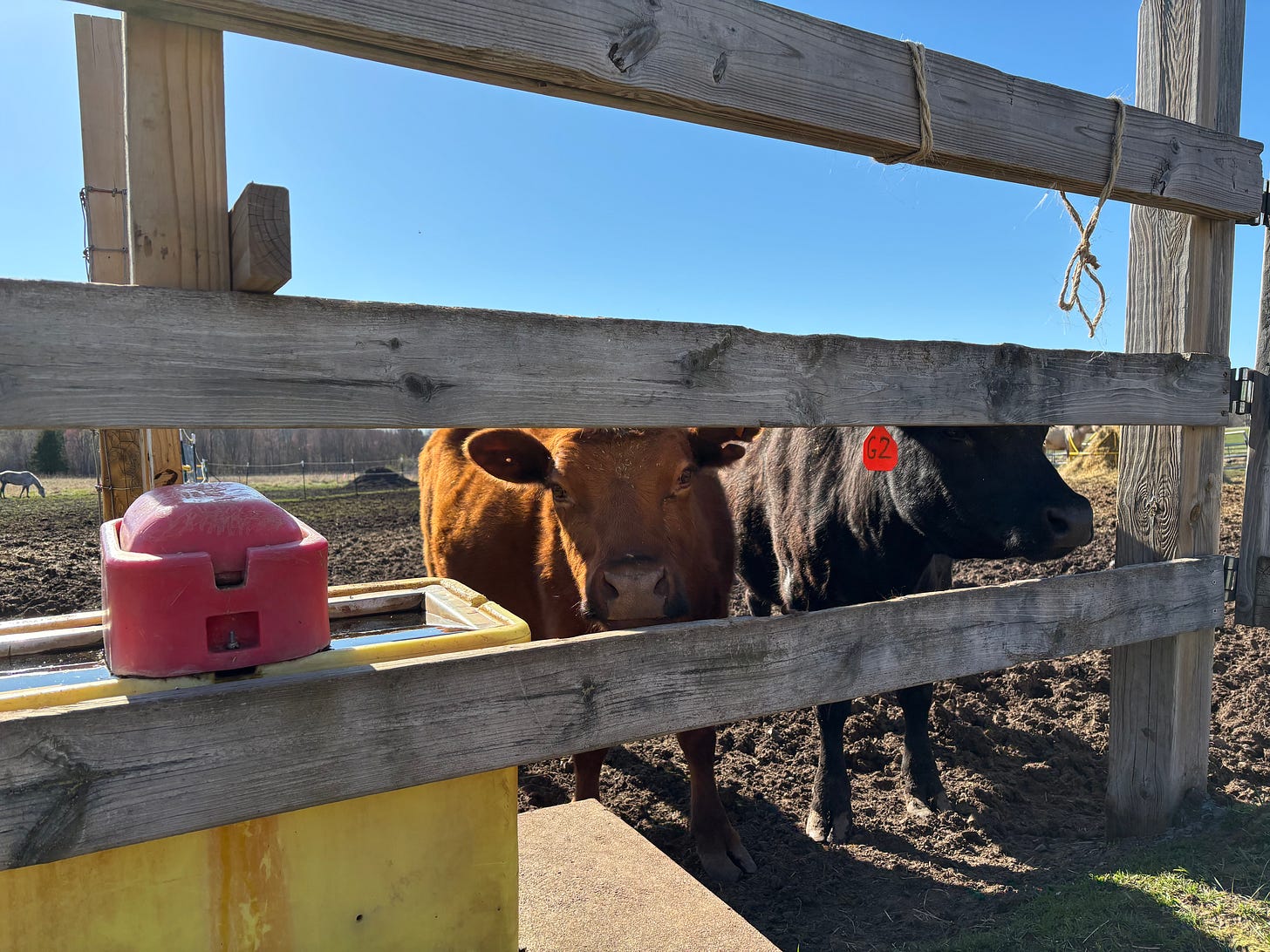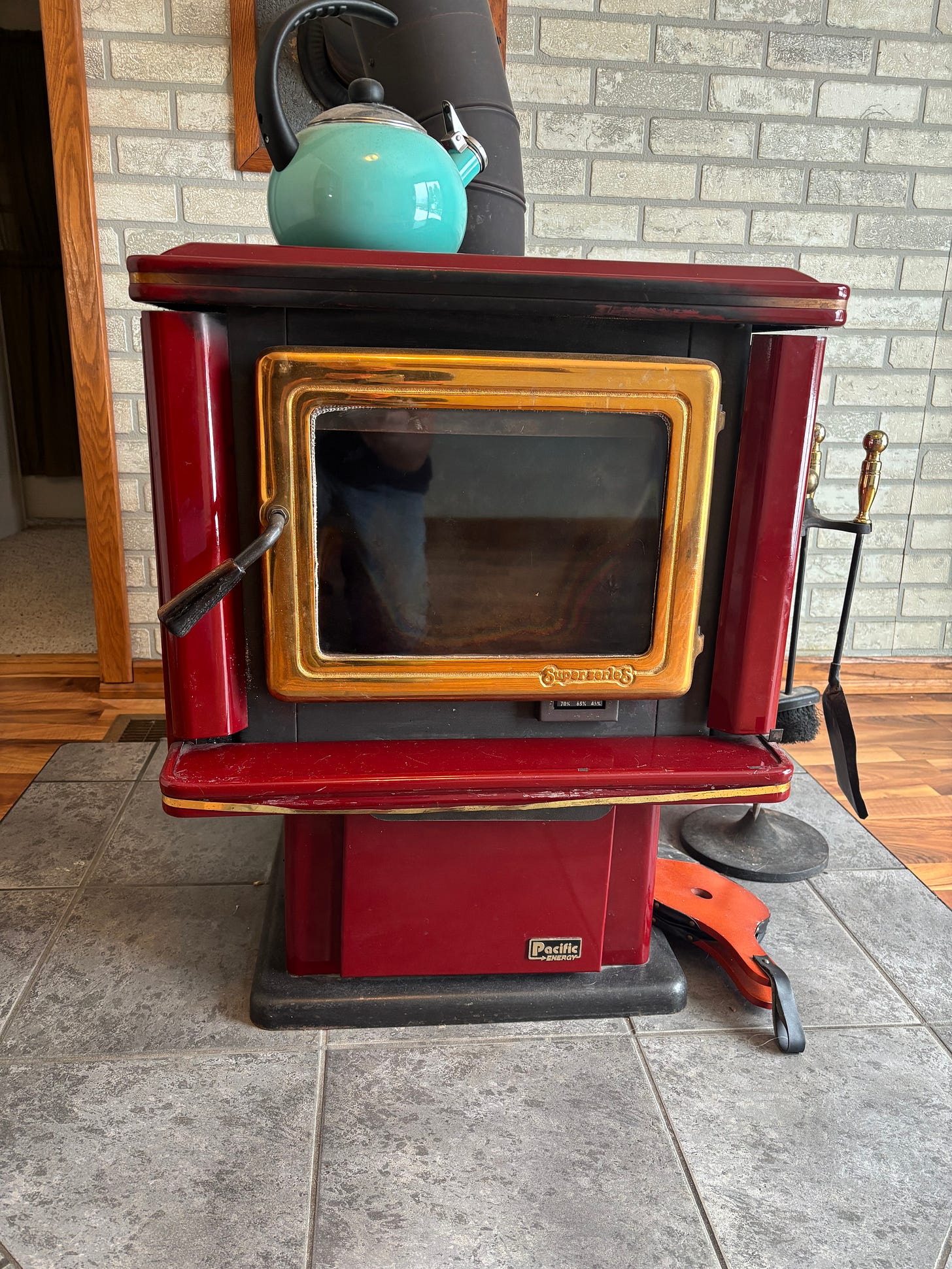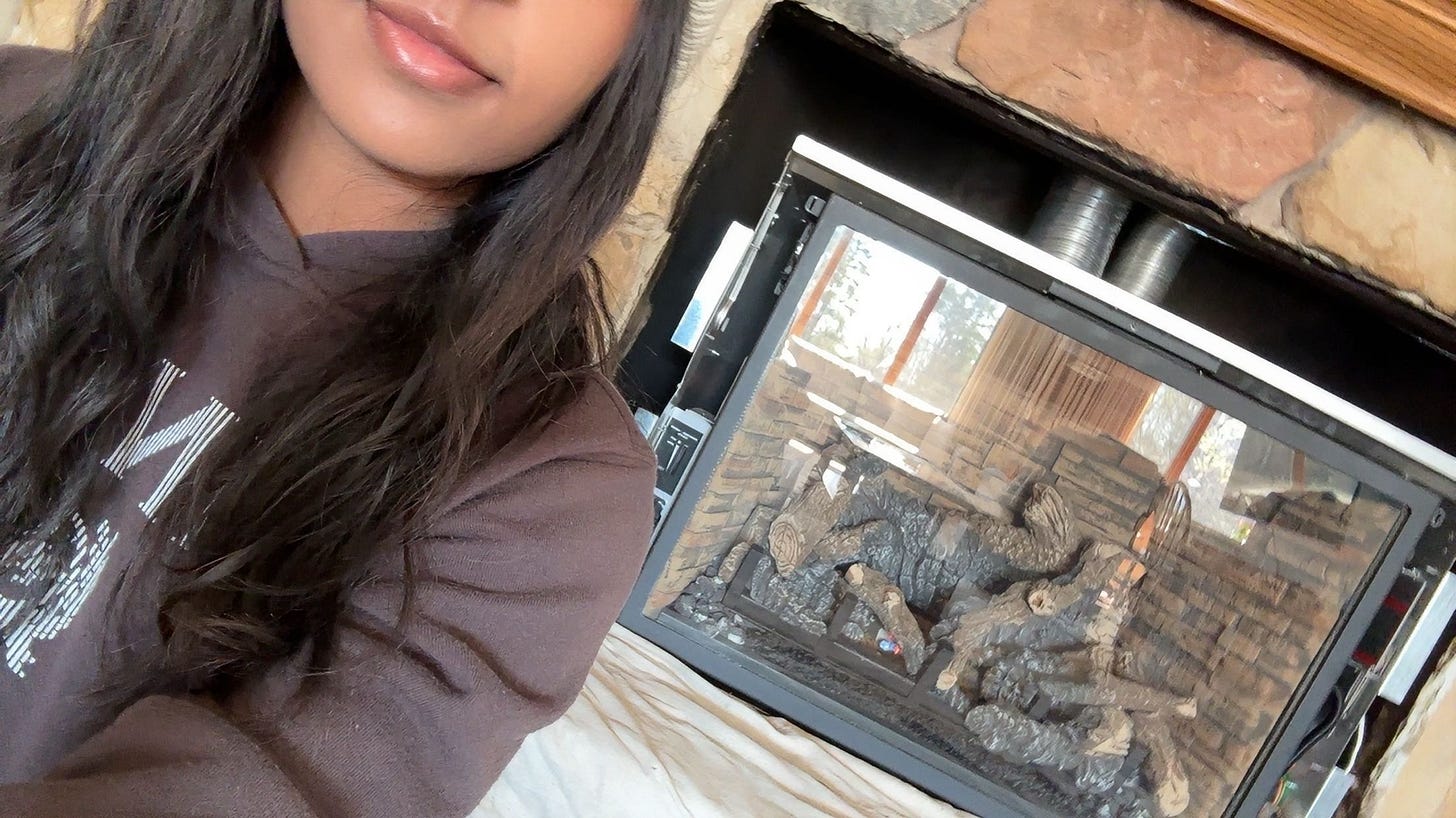Food Security: Prepping or Self-Reliance?
Productive capacity is better than stockpiling for creating food and energy security, no matter what the threat
Last week’s collapse of the electric grid in Portugal and Spain might have you thinking about “prepping.” At least, people are talking about it. The New York Times even wrote about it before the blackouts.
Fifty-five million people were without any electrical power for a day. Hospitals shut down. Grocery stores and banks closed. Trains stopped. People were trapped in elevators. Imagine all you can’t do without electricity.
Where I live, electrical power outage isn’t that unusual. We have winter storms, with high wind, snow, and ice. Power lines go down. We usually get power back within a few hours, but when it’s below zero, things cool off pretty fast, including your house. Pipes will freeze.
Perhaps worse, we have animals. A cow or horse drinks 5 - 10 gallons of water a day, though probably on the low end of the range when it’s cold. Most of the time, they drink from an automatic waterer. It’s electrically heated, plus the water is pumped electrically from a well. But if the power goes out and that freezes and runs dry, we either have to chop ice and haul water from a creek (illegal without a permit), or turn them all into the pasture that has the creek and keep a hole chopped into the ice. With 15 animals to water, requiring as much as 150 gallons a day, which weighs over 1200 pounds, we’re not going to be carrying any buckets.
So thinking about backup plans seems prudent. And while I don’t call myself a “prepper”, thinking about the bigger picture also seems prudent, especially when industry forecasts call where I live (the Midwest) the part of the country with the greatest grid instability, and which is likely to experience shortfall blackouts by 2028. And carrying this line of thinking into food supplies and everything else, even the most sober and unexcitable people are thinking preparedness, or at least maybe ought to be.
I’ve always been a bit rankled by the term and thought of “prepping,” which I picture as stockpiling tons of canned goods that you never eat and then throw out every few years. To me, a much more appealing picture is that of “self-reliance,” the difference being that, instead of stockpiling, I have developed the capacity to produce my own food. I don’t stockpile, I grow my own. I follow the seasonal ebb and flow of food production. I plant the seeds or breed the cow, tend to them, and, in time, harvest the vegetables or the beef. We have more food on hand some times of the year than others, but we have a reliable cycle of production, which can go on as long as there’s somebody to tend to things. My food security comes not in hoarding but in productive capacity. And, if necessary, I could do this with very few outside inputs.
When I picture stockpiling, I picture having to fight off jealous neighbors when the crunch comes. As the sale ads say, supplies are limited. When I picture self-reliance, and having neighbors who are self-reliant, I picture trading my neighbor beef for maple syrup or hay for honey, which I, in fact, do. The more people who are self-reliant, the more food secure we all are. I suppose that’s true for stockpiling as well, but self-reliance gives us a steady state of food security that doesn’t run out the way stockpiles do.
We’re all better off if we’re each better off. Individual self-reliance is good for us all.
Food security is what UnCowed is all about. Food security is just a good idea. Whether you’re focused on grid instability or social instability, political tyranny or corporate tyranny, there are lots of threats to our food supply. You may disagree on what those threats are or who they come from, but acknowledging the precarious nature of our food system transcends politics. What I hope to do at UnCowed is help increase our food security on a personal level.
Our most pressing needs, here as far north as you can go in the US east of the Mississippi, are water and heat. Both depend on electricity, and that’s a tough nut to crack. The drive to further electrify homes has only made matters worse. Thankfully, the Biden electric vehicle mandate has been ended, but there’s still a push for electric home heating (heat pumps), as well as electric stoves, water heaters, and other appliances. At the same time, we are closing reliable coal, oil and nuclear power plants, and replacing them with the sun, which shines a few hours a day, and wind, which blows when it feels like it, and sometimes not at all. However you feel about the so-called renewables, they are making our grid less reliable. See: Spain, this week.
Solar really doesn’t work here. When you get 200” of snow a year, it’s cloudy a lot in the winter. Our first fall here, we installed little solar lights on the fence posts along our driveway. They stopped working. Totally. We were ready to send them back and complain. But come spring, and the return of the sun, they started working again just fine. We didn’t have enough sun to power a crummy light you’d put along your garden path. So much for solar.
Home wind power is fantastically expensive, with estimates of $70,000 for a home wind turbine. That’s out.
With no good solution, we installed a generator run off the propane tanks that also heat our house. If the power was down for long enough, we’d run out of propane, but it would buy us time. We’re certainly not looking for ways to electrify our house further and make us even more dependent on outside sources. The only real solution is to reduce our electrical use for critical systems.
Heat is a problem because, in a rural area, your only available commercial fuel is propane, which is scary because there are legions of activists trying to shut down the pipeline that supplies our region. The New York Times positively reviewed a book titled “How to Blow Up a Pipeline.” I think it’s becoming a movie. Aforementioned pipeline also runs across a corner of our farm. I suppose if they blew it up, we wouldn’t have to worry about keeping warm, as long as the fires raged anyhow. Thank you, NYT. Typical of urban environmentalists to not even consider the effect on rural people.
And of course, in the shortest of short terms, your furnace won’t run at all without electricity to power the fan.
We do have a pretty good solution to the heat problem available in many rural areas: wood stoves. This is going to work better in some houses than others, depending on the layout. Ours is one of the houses it won’t work as well in. It was never designed to allow natural convective air flow, the way a house should be if you’re going to heat with a central wood stove. But even in our case, proper installation should allow us to keep the bedrooms at 50º F if the living and dining areas are at 75º F. Wood furnaces, that heat with air through ductwork or water through in-floor pipes, still require a fan and/or a pump, and don’t get around the need for electricity.
It always seems the quest for food and energy self-reliance has lots of unexpected benefits, such as healthier food, that are reason enough in themselves. In this case, my daughter has gotten her first job out of school as a wood stove installer, a technical trade that she’s enjoying. She’ll be installing our stove soon.
Food and energy security does require some planning, preparation, and effort. Maybe it’s not worth it to you, and that’s fine. But, for my part, it feels pretty good to be less dependent.









It is immensely satisfying to look in the pantry in the fall and to see the rows of home-canned food ready for winter. Sunshine in a jar, I say. Same with the honey from our hives, bee stings long since forgotten.
Lest anyone get all romantic about it, it's a ton of work, emphasis on "ton".
I am surprised at how many of our neighbors have never used a pressure canner, so every summer I have a "Let's can some green beans!" extravaganza on my back porch. With coffee cake, of course. Can't pass up the chance for a good chin wag.
We recently switched to a heat pump, but we have a wood stove and a sun room, which heat the house - the latter on sunny days, of which there are many here. We also eat out of the garden year-round, thanks to mild winters. Water is our biggest vulnerability, and we don't even have livestock to worry about. I do wonder how communities will respond in a blackout, however. Support or plundering?